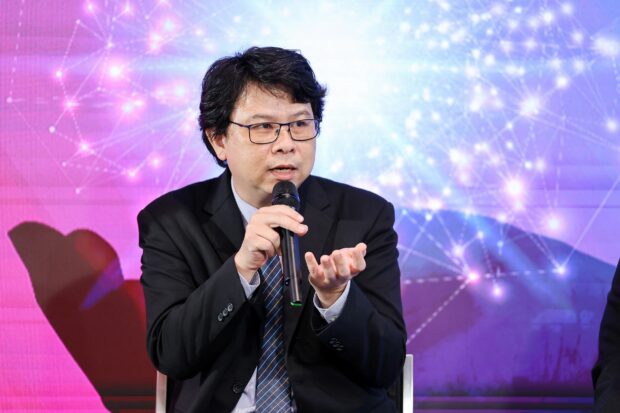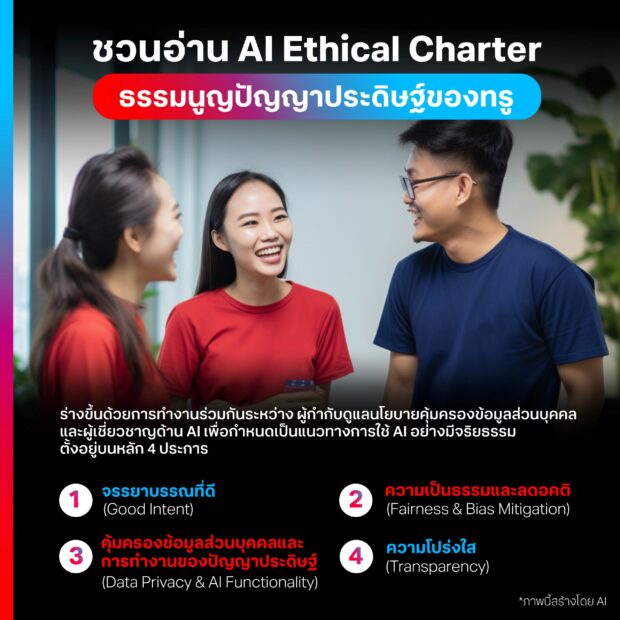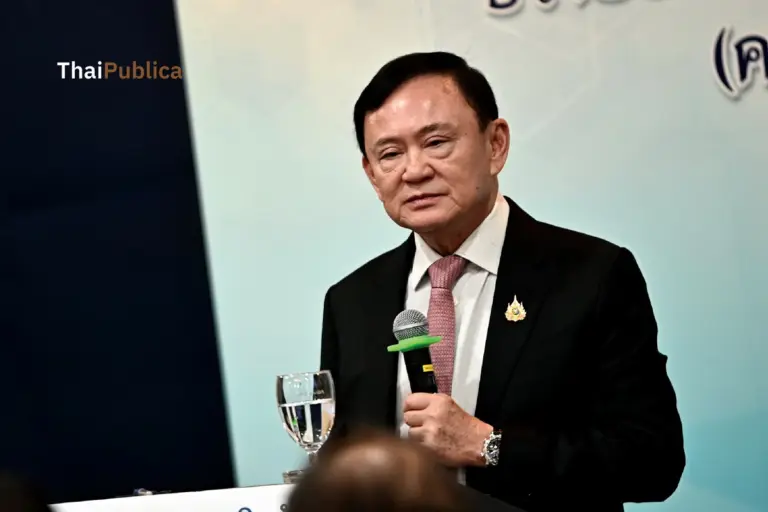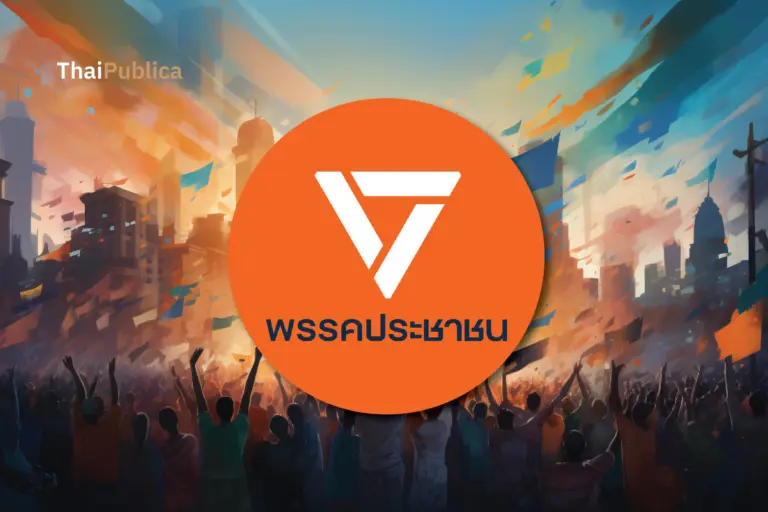ปัญญาประดิษฐ์หรือ AI อาจเรียกได้ว่าเป็นเทคโนโลยีเปลี่ยนโลก เป็นพลังสำคัญเพื่อการพัฒนาประเทศไทยให้เจริญเติบโต แก้ไขปัญหาสาธารณสุข ลดการปล่อยก๊าซเรือนกระจก ลดช่องว่างทางการศึกษา ฯลฯ ขณะเดียวกัน การพัฒนาของ AI อย่างไม่หยุดยั้งก็นำมาซึ่ง “ความท้าทายใหม่” ไม่ว่าประเด็นด้านความปลอดภัย ความเป็นส่วนตัว ทักษะ และช่องว่างในขีดความสามารถทางการแข่งขัน และเพื่อให้มั่นใจว่าการพัฒนา AI ที่เกิดขึ้นเป็นไปอย่างถูกต้อง ทรู คอร์ปอเรชั่น จึงได้จัดงานสัมมนา AI Gets Good โดยมีตัวแทนจากภาครัฐ ภาควิชาการ และภาคธุรกิจ ร่วมอภิปรายและแลกเปลี่ยนความคิดเห็นในหัวข้อ “ทำอย่างไรให้มั่นใจว่า AI จะสร้างผลกระทบเชิงบวกต่อสังคมไทย?”
กำกับดูแล = อุปสรรคหรือส่งเสริม?
ดร.ชัยชนะ มิตรพันธ์ ผู้อำนวยการสำนักงานพัฒนาธุรกรรมทางอิเล็กทรอนิกส์ กล่าวว่า เป็นที่ประจักษ์แล้วว่า ปัจจุบันทั่วโลกมีการใช้งาน AI อย่างแพร่หลายในรูปแบบบริการที่แตกต่างกัน ซึ่งมีทั้งคุณและโทษ ตัวอย่างเช่น โซเชียลมีเดียที่มี AI ทำหน้าที่เป็น “พื้นที่แห่งเสียงสะท้อน” (Echo Chamber) เป็นปรากฏการณ์ที่บุคคลหนึ่งๆ ในพื้นที่หนึ่งๆ ได้รับข้อมูลข่าวสารและความคิดเห็นเป็นไปในทิศทางเดียวกัน จนเกิดเป็นการรับสารด้านเดียว
จากผลกระทบเชิงลบของ AI ในมิติทางเศรษฐกิจ สังคมและความมั่นคงของชาติ ทำให้ผู้มีส่วนได้เสียเริ่มคำนึงถึงแนวทาง “การกำกับดูแล” แม้แต่ผู้พัฒนาเองก็เริ่มตระหนักถึง “ความเสี่ยง” ที่เกิดขึ้นจาก AI จนนำมาสู่แนวคิดในการ “หยุด” พัฒนาสักระยะเวลาหนึ่ง เพื่อศึกษาผลกระทบเชิงลบของ AI ต่อภาคส่วนต่างๆ
ทั้งนี้ แนวคิดการกำกับดูแล AI นั้น เริ่มขึ้นในสหภาพยุโรปที่ตระหนักถึง “ความเสี่ยง” จากการใช้ AI ในการละเมิดสิทธิในข้อมูลส่วนบุคคล และผลลัพธ์จากการประมวลผล โดย AI มีแนวโน้มที่จะส่งผลกระทบต่อการดำเนินชีวิตของประชาชน ทำให้ภาครัฐจำเป็นต้องมีมาตรการในการติดตามดูแลและควบคุมความเสี่ยง ขณะเดียวกัน อีกค่ายหนึ่งก็ส่งเสียง “คัดค้าน” การกำกับดูแล โดยเล็งเห็นว่าการกำกับดูแลจะเป็น “อุปสรรค” มากกว่า “ส่งเสริม” การพัฒนา AI
สำหรับประเทศไทยนั้น ยัง “ไม่มีความชัดเจน” ในแง่การกำกับดูแล AI โดยเขายอมรับว่า ภาครัฐไทยยังขาดประสบการณ์การใช้งานและการกำกับดูแล AI ซึ่งถือเป็นเรื่องใหม่ในการกำกับดูแล
“หากเร่งกำกับดูแลเทคโนโลยีก่อนเวลาที่เหมาะสม อาจเป็นการทำแท้งเทคโนโลยีก่อนที่เทคโนโลยีจะเกิดด้วยซ้ำไป ดังนั้น เราจึงเลือกใช้กลไกติดตามแนวทางจากต่างประเทศเป็นหลัก” ดร.ชัยชนะกล่าว
กลไกคลินิก AI
ปัจจุบัน สพธอ. มี ศูนย์ธรรมภิบาลปัญญาประดิษฐ์ (AI Governance Clinic: AIGC) เป็นกลไกหลักในการพัฒนากรอบธรรมาภิบาลปัญญาประดิษฐ์ผ่านการวิเคราะห์ความเสี่ยงของ AI ตามแต่ละโครงการ เพื่อหาข้อบ่งชี้ผลกระทบทางบวกและทางลบของการพัฒนา AI ตามแต่จุดประสงค์ ซึ่งหากการพัฒนานั้นมีแนวโน้มที่มีความเสี่ยงสูง หน่วยงานกำกับดุแลก็จะทยอยออกมาตรการเพื่อดูแลและควบคุมความเสี่ยงเป็นรายกรณีไป
“คลินิก AI ถือเป็นกลไกที่ช่วยส่งเสริมการประยุกต์ใช้ AI อย่างมีจริยธรรม” ดร.ชัยชนะ อธิบายพร้อมกล่าวเสริมว่า “บางอย่าง กลไกการกำกับดูแลตนเอง (Self-Regulation) ก็เพียงพอแล้ว แต่หากมองว่ากลไกกำกับดูแลไม่ได้ผล ก็อาจต้องร่างกฎหมายควบคุมดูแลอีกที ดังนั้น การกำกับดูแลการใช้ AI อาจต้องใช้ควบคู่กันไปผ่านทั้งกลไกกำกับดูแลตนเองและกฎหมาย เพื่อให้มีพื้นที่ในการพัฒนา สร้างความมั่นคั่งทางเศรษฐกิจต่อประเทศ ขณะเดียวกัน ก็ต้องพิจารณาถึงผลกระทบทางสังคมไปพร้อมกัน”
ขณะเดียวกัน เมื่อเร็วๆ นี้ รัฐสภายุโรป ได้ลงมติรับรอง “พระราชบัญญัติเพื่อการกำกับดูแลการใช้ปัญญาประดิษฐ์ (Artificial Intelligence Act)” โดยมีเป้าหมายเพื่อปกป้องคุ้มครองสิทธิขั้นพื้นฐานและหลักการประชาธิปไตยในภาคพื้นยุโรป ขณะเดียวกัน ยังคงสนับสนุนภาคธุรกิจต่อการพัฒนาปัญญาประดิษฐ์ เพื่อให้ยุโรปพิชิตสถานะผู้นำด้าน AI บนเวทีโลก
การประกาศดังกล่าวถือเป็นความเคลื่อนไหวสำคัญต่อวงการ AI โลก โดยถือเป็นกฎหมายฉบับแรกของโลกที่ระบุถึงแนวทางการกำกับดูแลการใช้ AI หลักการและเหตุผล ข้อควรระวัง รวมถึงบทลงโทษ
มอง AI เป็นระบบ
ด้าน ผศ.ดร.จิตร์ทัศน์ ฝักเจริญผล อาจารย์ประจำภาควิชาวิศวกรรมคอมพิวเตอร์ มหาวิทยาลัยเกษตรศาสตร์และผู้แปลหนังสือ “AI ที่มีหัวใจ The Ethical Algorithm” ให้ความเห็นว่า การกำหนดแนวทางการใช้ AI อย่างมีความจริยธรรมถือเป็นเรื่องที่ท้าทายอย่างมาก จำเป็นต้องกำหนดวิธีคิดและหลักเกณฑ์การพิจารณาอย่างชัดเจน
ตัวอย่างเช่น การกำกับดูแล “การใช้อัลกอริธึ่มอย่างมีจริยธรรม” จะต้องมีการกำหนดนิยามและองค์ประกอบอย่างชัดแจ้ง หากกำหนดให้อัลกอริธึ่มจะต้องปราศจากอคติและการเลือกปฏิบัติ ผู้ร่างจะต้องกำหนดนิยามของอคติให้ชัดเจน ซึ่งจากงานวิจัยที่ผ่านมา พบว่า อคติมีนิยามที่หลากหลายและดิ้นได้ ดังนั้น จึงต้องบ่งชี้ปัญหาที่เกิดจากอคติ กำหนดเกณฑ์ชี้วัด ใช้กรอบกำกับดูแลเป็นแนวทางโดยไม่พิจารณาในรายละเอียดจนเกินไป ที่สำคัญ การลดความเสี่ยงด้านอคติจาก AI อาจต้องแก้ไขที่สารตั้งต้น นั่นคือ การป้อนข้อมูล
“AI เป็นเรื่องของระบบ” ผศ.ดร.จิตร์ทัศน์ กล่าวและเสริมว่า ดังนั้น ไม่ว่าจะเป็นการทำความเข้าใจ การเรียนรู้ การใช้งาน รวมถึงการกำกับดูแล ผู้มีส่วนเกี่ยวข้องควรที่จะเข้าใจพื้นฐานความคิดอย่างลึกซึ้งและมอง AI อย่างเป็นระบบมากกว่าการมองปัญหาเป็นจุดๆ อย่างเอกเทศ

ผศ.ดร.จิตร์ทัศน์ ฝักเจริญผล อาจารย์ประจำภาควิชาวิศวกรรมคอมพิวเตอร์ มหาวิทยาลัยเกษตรศาสตร์และผู้แปลหนังสือ “AI ที่มีหัวใจ The Ethical Algorithm”
ความชอบธรรมแห่งการใช้ข้อมูล
นายมนตรี สถาพรกุล หัวหน้าสายงานคุ้มครองข้อมูลส่วนบุคคล บริษัท ทรู คอร์ปอเรชั่น จำกัด (มหาชน) กล่าวว่า AI เป็นเทคโนโลยีที่ฉลาดล้ำ จัดเป็นโครงสร้างพื้นฐานสมัยใหม่ที่มีบทบาทสำคัญในการขับเคลื่อนประเทศและองค์กร อย่างไรก็ตาม เมื่อพิจารณาถึงการใช้ประโยชน์จาก AI จะสามารถแบ่งออกได้เป็น 2 ส่วน ส่วนแรกคือ การใช้เทคโนโลยี และอีกส่วนคือ การใช้ข้อมูล ซึ่งในประเด็น “การใช้ข้อมูล” เขามีความเห็นว่า “ควรมีการกำกับดูแล” เพื่อรักษาสิทธิของเจ้าของข้อมูลให้เป็นไปตามวัตถุประสงค์ที่กำหนด
“ทำไม ทรู คอร์ป ต้องกำกับดูแลการใช้ AI ภายในองค์กร? เพราะเราต้องการให้เกิดความชัดเจนในการใช้ข้อมูล ตามวัตถุประสงค์ที่ชอบธรรม ซึ่งการใช้ AI อย่างมีจริยธรรมสะท้อนถึงการที่ ทรู คอร์ป เคารพใน ‘สิทธิ’ ของเจ้าของข้อมูล” มนตรี อธิบาย
นอกจากนี้ เมื่อวิเคราะห์ภูมิทัศน์ระบบนิเวศ AI จะสามารถแบ่งประเด็น “ความเสี่ยง” ที่เกี่ยวข้องกับ AI ได้ 3 ประเด็น ดังนี้ 1. นโยบายความเป็นส่วนตัวของข้อมูล 2. เงื่อนไขการใช้ข้อมูล เพื่อป้องกันผลลัพธ์ที่เป็นอคติ และ 3. ความเข้าใจในเทคโนโลยี AI ต่อสาธารณชน
ทั้งนี้ เพื่อเป็นเครื่องการันตีว่าผู้บริโภคจะได้รับประโยชน์สูงสุดจากการใช้ AI ในการดำเนินงาน ทรู คอร์ป จึงได้ร่าง “ธรรมนูญปัญญาประดิษฐ์” (True’s AI Ethical Charter) เพื่อเป็นแนวทางการใช้ AI อย่างมีจริยธรรม” โดยกำหนดหลักการพื้นฐานสำคัญ 4 ประการ ได้แก่ 1. เจตนาดี 2. ความเป็นกลาง ปราศจากอคติ 3. ความเป็นส่วนตัวของข้อมูล และ 4. ความโปร่งใส
“ข้อมูลเป็นฐานสำคัญที่ทำให้ AI ทำงานได้” มนตรีกล่าว และแม้ว่าประเทศไทยจะยังไม่มีกฎหมายที่เกี่ยวข้องกับ AI เฉพาะ แต่กฎหมายไทยในปัจจุบันได้กำหนดแนวทางและกรอบการใช้งาน “ข้อมูล” อย่างชัดเจนอยู่แล้ว ไม่ว่าจะเป็น พ.ร.บ.คุ้มครองข้อมูลส่วนบุคคล พ.ศ.2562 รวมถึงประกาศ กสทช. เรื่อง มาตรการคุ้มครองสิทธิของผู้ใช้บริการโทรคมนาคมเกี่ยวกับ ข้อมูลส่วนบุคคลสิทธิในความเป็นส่วนตัวและเสรีภาพในการสื่อสารถึงกันโดยทางโทรคมนาคม
“การพัฒนา AI ก็เปรียบเสมือนการเลี้ยงเด็ก ในทางเดียวกัน การกำหนดแนวทางการใช้ AI อย่างมีจริยธรรมก็เพื่อให้พวกเขาเจริญเติบโตเป็นสมาชิกที่ดีของสังคม” มนตรี เปรียบเทียบ
สอดรับกับความเห็นของ ‘เรวัฒน์ ตันกิตติกร’ หัวหน้าสายงาน Channel Excellence แห่งบริษัท ทรู คอร์ปอเรชั่น จำกัด (มหาชน) โดยเขามองว่า AI จะมีจริยธรรมหรือไม่ ขึ้นอยู่กับข้อมูลที่ให้ AI วิเคราะห์ โดยมี “จุดประสงค์” ของการใช้งานเป็นตัวแปรสำคัญ
……..
Does Thailand Need to Regulate Artificial Intelligence?
Artificial intelligence (AI) can be a powerful force for good in Thailand, improving healthcare, reducing carbon emissions, bridging educational divides and many more. But AI also comes with new challenges in terms of safety, privacy, skills and competitiveness gaps.
With the aim to ensure that AI moves ahead on the right track, True Corporation recently organized the AI Gets Good seminar. Representatives from the government sector, the academic sector, and the business sector came together at the event to discuss on “How to ensure that AI creates positive impacts in Thai society?”
Regulation: Boon or Bane?
Dr. Chaichana Mitrpant, Executive Director of the Electronic Transactions Development Agency (ETDA), said AI applications are now in widespread use across the world with both benefits and adverse impacts. For example, AI has already turned social media into an “echo chamber,” meaning users get exposed to information or opinions that resonate with their beliefs, are one-sided, and insulate them from rebuttals.
AI may also disrupt the economy, create new societal divides or affect national security. Hence a growing chorus of calls to regulate this technology. Some AI developers have even called for a pause in AI development while studies on AI’s adverse impacts are being conducted.
Work on AI regulation is most advanced in Europe. The European Union is set to introduce measures to monitor and govern AI’s emerging risks. The move has its supporters but has also drawn criticism from people who think AI governance will hinder rather than promote AI development.
In Thailand, AI governance remains “vague.” Dr. Chaichana admitted that Thai authorities still lacked experience in AI application and governance because they were relatively new things in the Thai society.
“If we rush to govern a technology at an inappropriate time, we may abort the technology before it is really born. So, we have decided to mainly monitor AI regulatory guidelines from developed countries,” he explained.
Writing a New Playbook for AI
ETDA also conducted an AI Governance Clinic (AIGC) as a key mechanism in AI governance framework development. The clinic has analyzed AI risks in each applicable project to specify indicators of both positive and negative impacts from AI development. If risks are high, regulators will roll out measures to monitor and control the risks in the project involved.
“AIGC promises to foster ethical AI applications,” Dr. Chaichana said. “In some cases, self-regulation is enough. But in some other cases, it may prove inadequate and thus we may need to draft a law to govern it. AI governance, as a result, will need both self-regulation and laws for the purpose of creating a space that enables technology development and fosters economic security while addressing social impacts.”
Recently, the European Parliament reached a provisional agreement on its Artificial Intelligence Act to protect fundamental rights and democratic principles in Europe. All at the same time, it has supported the business sector’s efforts to develop AI further in pursuit of the goal of establishing Europe as the world’s AI leader.
This milestone act will be the world’s first legislation on AI. Its contents detail rationale, principles, AI governance guidelines, cautions, and punishments for misuse of the new technology. Hence, it goes much further than statements on the need for ethical AI as was seen in the USA and the UK.
AI as a System
Asst. Prof. Dr. Jittat Fakcharoenphol, Vice-Chair of the Computer Engineering Department at the Kasetsart University and the translator of “The Ethical Algorithm,” (by Michael Kearns and Aaron Roth, published by Salt) commented that it was particularly challenging to lay down ethical guidelines for AI applications. The task, he emphasized, requires clear operational procedures.
For example, the governance of an ethical algorithm must have clear definitions and components. If an algorithm is expected to be unbiased and non-discriminatory, drafters of the governance guidelines must define the term “bias” very clearly. To date, research has shown there are so many definitions of bias and the word can be interpreted in various different ways. In Prof. Jittat’s opinion, the governance guidelines should identify biases clearly and set the right frameworks to reduce bias-related risks in data inputs for AI training.
“AI is a system,” he said. “Relevant parties should understand this fact for them to properly learn about, use and govern AI. Because it is a system, AI-related problems should be addressed together, not separately.”
Legitimacy of Data Usage
Montri Stapornkul, Head of Personal Data Protection at True Corporation Public Company Limited (True), described AI as a modern infrastructure with a crucial role to play at both enterprise and national levels. The utilization of AI can be divided into two parts: technology usage and data usage. Montri believes governance should be in place for data usage to protect the rights of data owners.
“True issued a charter for ethical AI to ensure that our data usage is transparent, legitimate, and in line with stated purposes. Our ethical AI application is reflected through our respect for data owners’ rights,” Mr. Montri said.
According to him, AI systems have three types of risks: 1) Risks related to Data Privacy Policy; 2) Risks related to Data Usage Conditions; and 3) Risks related to Public Understanding of AI.
To provide assurances that consumers will enjoy maximum benefits from AI applications, True has drawn up “True’s Ethical AI Charter,” which comprises four pillars: 1) Good Intent; 2) Fairness and Bias Mitigation; 3) Data Privacy; and 4) Transparency.
“Data is the foundation for AI applications. Although Thailand has not yet had a dedicated AI law, existing legislations had already laid down clear frameworks on data usage,” Mr Montri said, referring to the Personal Data Protection Act B.E. 2562 and the National Broadcasting and Telecommunications Commission’s Announcement on the Protection of Telecom Service Users’ Rights to Privacy and Communications Freedom. “Metaphorically, AI development is like raising a child. When we prepare ethical guidelines for AI, it will progress well and become a good member of our society.”
His opinion was echoed by Raewat Tankittikorn, Head of Channel Excellence at True. Mr. Raewat said whether AI would be ethical or not depended on the kinds of data used for its training with the purpose of AI usage as another key factor.









